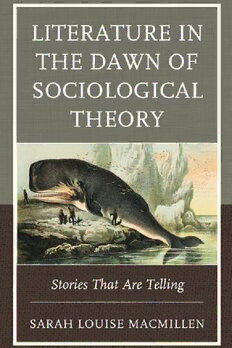
Literature in the Dawn of Sociological Theory: Stories That Are Telling PDF
Preview Literature in the Dawn of Sociological Theory: Stories That Are Telling
Literature in the Dawn of Sociological Theory Literature in the Dawn of Sociological Theory Stories That Are Telling Sarah Louise MacMillen LEXINGTON BOOKS Lanham • Boulder • New York • London Published by Lexington Books An imprint of The Rowman & Littlefield Publishing Group, Inc. 4501 Forbes Boulevard, Suite 200, Lanham, Maryland 20706 www.rowman.com 86-90 Paul Street, London EC2A 4NE Copyright © 2022 by The Rowman & Littlefield Publishing Group, Inc. Chapter Five: Parts of this chapter were previously published in Soundings and used with permission. MacMillen, Sarah L. 2020. “From Herland to #MeToo: Utopia or Dystopia?” Soundings 103 (2): 243–263. All rights reserved. No part of this book may be reproduced in any form or by any elec- tronic or mechanical means, including information storage and retrieval systems, without written permission from the publisher, except by a reviewer who may quote passages in a review. British Library Cataloguing in Publication Information Available Library of Congress Cataloging-in-Publication Data Available ISBN: 978-1-7936-2805-3 (cloth : alk. paper) ISBN: 978-1-7936-2807-7 (pbk. : alk. paper) ISBN: 978-1-7936-2806-0 (electronic) The paper used in this publication meets the minimum requirements of American National Standard for Information Sciences—Permanence of Paper for Printed Library Materials, ANSI/NISO Z39.48-1992. This book is dedicated to all of the humanists in my life— family, friends, mentors, colleagues, and students. Contents Acknowledgments ix Chapter One: Literature in the Dawn of Sociological Theory 1 Chapter Two: New England Shadows: Hawthorne, Faust, and the American Spiritual Character 23 Chapter Three: Moby Dick as Modern Epic: “Symphony” in a Broken Ontology 41 Chapter Four: Literary Metanoia and the Sociological Imagination in Joseph Conrad: Colonialism and Western Idealism 61 Chapter Five: Women and Men: The Tragicomic 83 Chapter Six: Suspending Modernity: Gender and History in Virginia Woolf’s Orlando 101 Chapter Seven: The Absurd Christian: The Sociological Imagination of Dostoevsky 123 Chapter Eight: Conclusion: Stories in the Dawn of Capitalism— Crisis and Narrative in Boccaccio’s Decameron 141 References 155 Index 167 About the Author 169 vii Acknowledgments Why is a sociologist writing about literature? This is a question often repeated by countless persons—from family to friends to critics—during the last few years of this project. This was an important challenge and a constant reminder of why literature is increasingly devalued in the social sciences and wider academic spheres. But it was also a nudge for me to make a case that the literary imagination is important not only within sociology’s theoretical traditions, but literature also illuminates the realities of social life beyond the limits and scope of sociological inquiry and methodology. First, credits to earlier versions of these papers and their helpful audiences and reception. Portions of these papers appeared at several conferences. A few (preliminary remarks on) chapters were presented at the Midwest Sociological Society: Chapter Two on Hawthorne in 2016 and Chapter Five on Charlotte Perkins Gilman’s Herland in 2019. Harry Dahms edited an issue of Soundings (Pennsylvania State University Press) where an earlier edition of Chapter Five appeared. A version of the Virginia Woolf chapter was presented at the American Sociological Association (ASA) in 2017. The Boccaccio chapter was presented at Self & Society conference, an affiliate of ASA, in 2020. And sections of the Moby Dick paper were delivered at Self & Society in 2015, and the International Social Theory Consortium in 2021. The thumbnail sketches of the Dostoevsky chapter were published in my University of Pittsburgh colleague Ryan McDermott’s venture, the Genealogies of Modernity’s blog in 2020. I first studied literature within higher education, under the direction of my major in Classical Studies and Religion at Boston University. A seminar with the former president of the American Academy of Religion, Ray Hart, was a deep inspiration to the chapter on Moby Dick. Other influences in read- ing literature as a wider force shaping culture, psychology, and sociology ix
